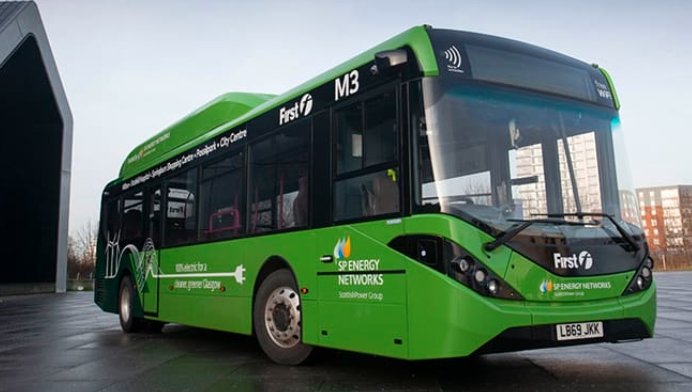Fifteen First Bus depots across Scotland and England are now offering their powerful chargers to third-party users — including, for the first time, the general public in Glasgow. The bold expansion of its “First Charge” network aims to plug a major gap in EV infrastructure.
The move marks a significant shift in how the UK’s public transport giants can support the country’s electric transition — not just for their own fleets, but for everyone from delivery drivers to curious first-time EV owners.
Glasgow depot takes the lead — and the leap
Until recently, First Bus’s charging facilities were used exclusively for its own vehicles. Not anymore.
At the heart of this push is the Caledonia depot in Glasgow. The site, already one of the largest EV charging hubs for buses in the UK, is now accessible to the general public. Yep — ordinary drivers can now pull into a First Bus site and top up their EVs.
This isn’t a trial. It’s already live.
And it’s significant. Most EV charging infrastructure has focused on consumer roadside needs or supermarket car parks. High-speed, depot-grade chargers have remained off-limits to all but fleet operators. First Bus just changed that.

Who’s already plugging in?
First Bus hasn’t opened the doors to just anyone overnight. There’s been a gradual build-up.
Earlier in 2025, the company struck a deal with Paua — a firm that helps businesses manage EV fleet charging. That opened the gates, quite literally, to commercial operators looking for powerful, reliable top-ups in city centres.
These businesses have already been tapping into First Bus depots:
-
DPD, the courier giant
-
Centrica, the parent of British Gas
-
Openreach, BT’s broadband infrastructure arm
-
Police Scotland, one of the early public sector adopters
They’re not just testing the system. They’re using it daily, especially in places where regular public charging just can’t keep up with commercial demand.
Filling a hole in the EV infrastructure
Let’s face it — EV charging in the UK isn’t exactly where it needs to be. Especially if you run a fleet of vans or work vehicles that return to urban areas late at night.
Public chargers are either too slow, too busy, or just not there.
That’s why what First Bus is offering is such a big deal. Their depots:
-
Are secure
-
Offer high-speed charging
-
Operate during off-peak hours
-
Sit right in the middle of urban transport corridors
Most importantly? They already exist. There’s no need to build from scratch.
One small paragraph here.
And that, according to the company, is the magic sauce. “This is about using what we’ve already got — faster, smarter, and better,” said one First Bus exec, off the record.
15 sites, £320 million invested — and counting
This isn’t some one-off PR move.
First Bus says it’s already spent over £320 million on electrification — buses, chargers, depot retrofits, training, the lot. And the 15 depots now open to third parties are just the start.
Let’s break down the numbers a bit:
| Location Type | Total Sites | Public Access | Commercial Access |
|---|---|---|---|
| England Depots | 9 | 0 | ✅ |
| Scotland Depots | 6 | 1 (Glasgow) | ✅ |
| Future Rollout | TBC | More by 2026 | ✅ |
Out of the 15 total, only Glasgow is currently open to the public. But insiders say more sites could follow if demand takes off.
One line here.
And judging by the response so far, it just might.
Why this model could catch on
Opening up depot infrastructure to outsiders isn’t exactly common — but it’s catching on fast.
Transport firms are sitting on a goldmine of assets: chargers, land, staff, security. Until recently, they were hoarding it all for themselves.
Now? The smarter ones are seeing opportunity.
Isabel McAllister, First Bus’s Chief Sustainability and Compliance Officer, put it plainly: “We’ve invested big. But if we can help others move faster too, why wouldn’t we?”
That attitude’s not just refreshing — it’s practical. Decarbonisation isn’t a solo sport.
And the truth is, smaller operators — from florists to film crews — need help bridging the gap.
Still some hurdles — but momentum’s real
Of course, not everything’s smooth sailing.
There are questions. Liability? Insurance? Booking systems? Staff overtime?
Yes, these things need sorting. And yes, the company has to balance its own needs with those of new users. That’s where Paua comes in — they manage access, usage logs, billing, and system integration.
But the direction of travel is clear. What used to be locked away behind depot gates is now becoming a shared resource.
And that’s probably how it should be.


















